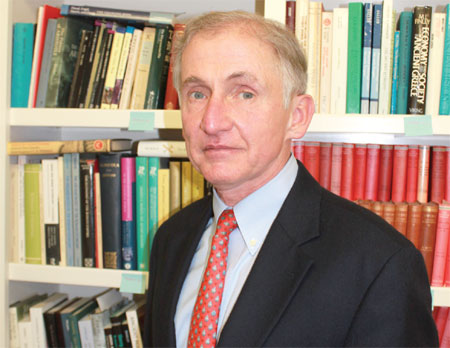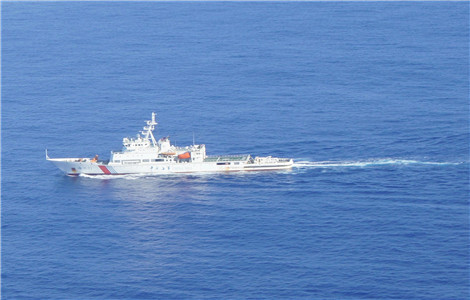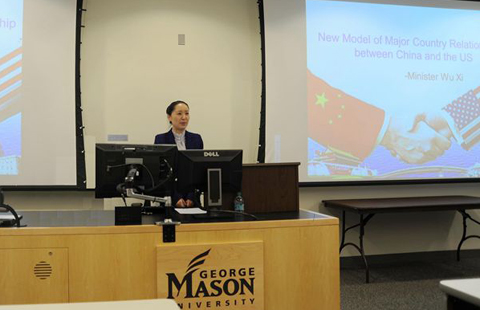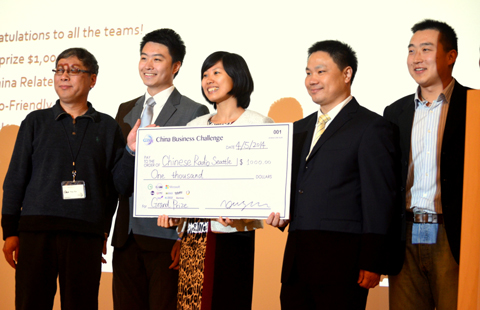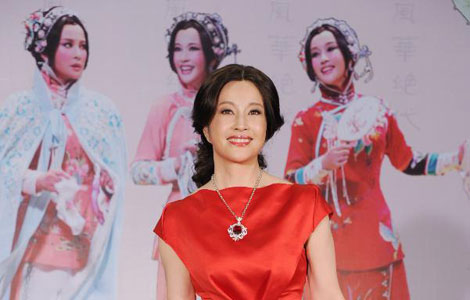Stanford dean: Builds bridges with CI
Updated: 2014-04-04 07:08
By Qidong Zhangin San Francisco (China Daily USA)
|
||||||||
Piles and piles of documents sit on the desk of Richard Saller, Stanford University's dean of Humanities and Sciences, awaiting his attention. In addition to teaching and overseeing more than 550 professors at the California-based school, he is director of the Confucius Institute on Chinese language and culture.
Saller was approached by Hanban, a Chinese government-affiliated group under the Chinese Ministry of Education, about establishing a Confucius Institute at Stanford after Sun Chaofeng, professor of East Asian languages and cultures, made the initial introduction.
According to Sun, a Chinese education representative invited him around 2005 to apply for a grant to study Chinese language at Stanford, which spurred the initial conversations about a research-oriented institute. Through another Beijing organization, it led to Hanban’s initiatives in the US for the Confucius Institutes.
Saller said although there was “no major stumble” during the process, it took three years to establish a partnership between Stanford and Peking University (PKU), one of China’s top research universities, and Hanban.
|
Richard Saller, Stanford University's dean of Humanities and Sciences, said Confucius Institute benefits both Chinese and American cultures. Qidong Zhang / China Daily |
“After all, it was the first Confucius Institute of its kind in the US, we worked the program out with the Hanban director Xu Lin involving Chinese classics and translation that was implemented into the institute,” Saller said. “I felt it is vital that we help our students to understand Chinese literature, history and culture, which is really the root of communication and understanding between US and China.”
Under the December 2009 agreement, Hanban donated $1 million for conferences and other programs, $1 million for two graduate fellowships, and $2 million for a Confucius Institute professorship in sinology, which was eventually devoted to classical poetry because Stanford needed a scholar in that field. Stanford matched the gifts, which also funded an endowment for the institute.
Saller said CI is a bridge that promotes mutual understanding among Chinese and American people and academics, and benefits both Chinese and American cultures.
“I believe it is vital that we establish communication and study channels between China and US so that we understand each other from history, culture and languages,” Saller said. “The US-China relationship is dependent on such understanding and in today’s world simply because we cannot afford making any mistakes of any kind,” said Saller.
Since 2005, more than $500 million has been spent to establish 350 Confucius Institutes worldwide and about 75 in the US, four times the number in any other country, according to Hanban’s annual report. Stanford University was among the top 20 US universities and colleges that opened a Confucius Institute in 2010.
“Confucius Institute is particularly in humanities, so we have contemporary Chinese authors talk about comparative literature. Within our department we try to offer a full range of Chinese studies at the Institute. Professors Wang Ban, for instance, teaches Chinese literature and film, comparative literature, aesthetics, critical theory, intellectual history; and Sun Chaofeng teaches Chinese linguistics, history of Chinese, Chinese classical, and even Chinese as a second language.”
Wang, who is chair of the department of East Asian languages and cultures housing the Confucius Institute, was involved at the initial stage of setting up the CI. He is a member of the Confucius Institute Advisory Board and manages CI’s daily affairs. Wang said two PhD students are studying at CI and will graduate in about two to three years.
“The CI at Stanford allows researchers in the US to have an excellent platform of scholarly research and exchange with our Chinese colleagues in Peking University and other Chinese universities. It raises the profile of Stanford as a significant player in international academic and educational communication with China,” said Wang.
Saller grew up in Kansas City and went to the University of Illinois where he studied engineering but switched to history after taking a class in Roman history and literature. He received his doctorate from Cambridge University.
Saller went to Stanford in 2007 from the University of Chicago where he had served as its provost (2002-2006), and dean of the social sciences division (1994-2001). He was elected to the American Academy of Arts and Sciences in 2005. Saller’s wife Tanya Luhrmann, a psychological anthropologist best known for her studies of modern-day witches, charismatic Christians, and psychiatrist, teaches at Stanford’s anthropology department.
“My first exposure to Chinese history was back in the 1970s when I discovered that China has a direct test for entry into government service, in contrast to Rome,” he said.
As a historian of ancient Rome, Saller said that he is no China expert, but devotes much of his time to examining both European and Chinese social, cultural and economic changes from ancient times to the present. “I ask myself to draw connections in my research and my students, and fellow scholars,” he said. “I also try to ask myself and my students how the past can illuminate the modern world so that we could implement the same to students at the Confucius Institute.”
Saller believes a university should allow young students to explore their creative ideas in all fields, including science, engineering and humanities, and that the cultural exploration between the US and China by students at the Confucius Institute is crucial to the understanding of the two countries.
“The exchange program between Peking University and Stanford is where teachers and students from both countries can learn, teach and experience each other’s culture and history, and become the biggest source for culture teaching in the long run. Now Chinese universities are open to receiving international students. I wish Stanford can facilitate as much, but our resource is limited, and CI is a starting point,” he said.
He said at an October program at PKU campus faculty and administrators can discuss higher education in a global context.
Striving to position Stanford’s School of Humanities and Sciences to meet the challenges of the 21st century, Saller said the Confucius Institute now houses a reference library on China, and presents lectures and workshops that are open to the public. He also said Chinese has become the second most popular foreign language at Stanford University.
Wang said that Stanford’s Confucius Institute frequently comes under criticism.
“Critics presume that our CI is funded and is thus controlled by the Chinese government. They are wrong in more ways than one,” he said.
“The CI is funded by an endowment, half of which comes from the Hewlett Foundation, with no strings attached. Stanford faculty and administrators manage and make decisions for CI events and programs,” Wang said.
“On the other hand, the Chinese government, for all its problems, is a legitimate government, which is trying to forge good relations with the US and is a positive force in making the world a better and prosperous place. It is wrong and detrimental to Sino-US relations to assume that anything to do with the Chinese government portends evil or deprivation of freedom.”
Most Viewed
Editor's Picks
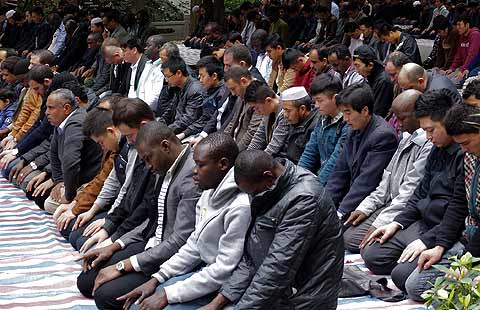
|

|

|

|

|

|
Today's Top News
Chinese minister cautions the United States
Gala celebrates Chinese dreams
Museum teaches kids about Qingming
Latest signals fuel hope
Australia also detects suspicious pulse signal
Kidnappers make 1st phone call to family of Chinese tourist
Kidnapping scares Chinese tourists
Manhattan fights for Chinese tourists
US Weekly

|

|
